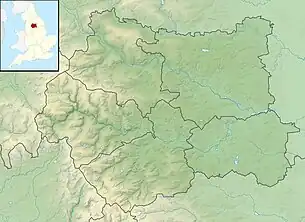| Kirkthorpe Hydro | |
|---|---|
 Location within West Yorkshire | |
| Country | England |
| Location | Kirkthorpe, Wakefield |
| Coordinates | 53°41′11″N 1°27′35″W / 53.6865°N 1.4597°W |
| Purpose | Power |
| Status | Operational |
| Construction began | April 2016 |
| Opening date | March 2017 |
| Construction cost | £5.3 million ($7.6 million) |
| Type | Conventional |
| Turbines | 1 |
| Annual generation | 500 kW |
Kirkthorpe hydro is a hydroelectric generating plant located on the River Calder at Kirkthorpe Weir, 4 miles (6.4 km) east of the City of Wakefield in West Yorkshire, England. The plant was opened in 2017 and expects to be generating electricity for 100 years. Kirkthorpe Weir is the highest industrial weir in Yorkshire and has prevented fish passing upstream to spawn; the new hydro project has a fish pass built into it.
At a nameplate capacity of 500 kW, along with another plant at Brotherton on the River Aire, the plant is jointly the largest hydroelectric generator in Yorkshire.[1]
History

Kirkthorpe Weir, which is a grade II listed structure, has been an obstruction for fish passing up the River Calder since it was built in 1827.[2] It is a 13 feet (4 m) drop weir which is the highest in Yorkshire,[3] and was built to maintain a steady flow of water into the Aire and Calder Navigation which branches off just upstream of Kirkthorpe Weir on the left bank.[4] Barn Energy proposed building a hydroelectric power station on Kirkthorpe Weir, with permission being granted by Wakefield Council, on whose land the power station is located.[5] Work on the £5.3 million ($7.6 million) project was started in April 2016 and generation started in March 2017.[6][7]
Special measures were taken to adopt a fish pass and a separate eel pass. The turbine channel has screen at both ends to prevent fish being sucked in from the top and also to stop larger fish entering from the bottom. The eel pass has a constant flow of water and is protected by overhead screens to prevent predation.[8] The power station has a 500 kW capacity which will generate 2.3 million units of electricity per year, enough to power over 800 homes.[9]
In 2019, the site was furnished with a 1,200 kWh lithium-ion battery.[10] As the turbine is generating constantly with water running through the power station, the unused electricity is stored in the battery which can be released at a time when supplies are lower.[11]
In 2019, Kirkthorpe Hydro along with Thrybergh Hydro, a sister project on the River Don also built by Barn Energy, were sold to JLEN in a £4.3 million deal.[12]
References
- ↑ "Hydropower station could start generating electricity to power homes". Wakefield Express. 14 October 2016. Retrieved 20 July 2019.
- ↑ Historic England. "Kirkthorpe Weir and Sluice Gates (Grade II) (1200709)". National Heritage List for England. Retrieved 21 July 2019.
- ↑ Fearnley, Steve (28 March 2017). "Angling: Hydro's the 'weir' to go for anglers and the fish". Yorkshire Evening Post. Retrieved 20 July 2019.
- ↑ "Kirkthorpe Weir and Hydropower Station". Wessex Archaeology. Retrieved 21 July 2019.
- ↑ "Work starts on £5.3m hydropower scheme in Yorkshire". www.waterbriefing.org. 20 April 2016. Retrieved 20 July 2019.
- ↑ "Hydro-electric plant being built on River Calder". Pontefract and Castleford Express. 18 April 2016. Retrieved 20 July 2019.
- ↑ "England's 500-kW Kirkthorpe small hydropower plant officially opens". Hydro World. 15 March 2017. Retrieved 20 July 2019.
- ↑ "KIRKTHORPE HYDROPOWER: Bringing Salmonids back to the Calder Valley" (PDF). wakefield.gov.uk. Retrieved 20 July 2019.
- ↑ "Hydro-electric plant being built on River Calder". infoweb.newsbank.com. 18 April 2016. Retrieved 23 July 2019.
- ↑ "Barn Energy installs batteries at 2 UK hydro schemes". renewablesnow.com. Retrieved 21 July 2019.
- ↑ Blaber, Russ (June 2018). "Co-locating Battery Storage with Hydropower Generation" (PDF). British-hydro.org. Cobalt Project Management Ltd. p. 10. Retrieved 23 July 2019.
- ↑ Snowden, Ros (20 July 2019). "Yorkshire green energy firm snapped up in multi-million pound deal". The Yorkshire Post. Retrieved 20 July 2019.
